
My most anticipated album for ten years running has arrived.
I first heard demos for Atoms and Void’s And Nothing Else sometime in 2005, back when the group was called Ghost Wars and debuting new material on MySpace was normal. To say the project intrigued me is a vast understatement: this collaboration between former Juno singer/guitarist Arlie Carstens and longtime Damien Jurado cohort Eric Fisher faced the immense task of following up my favorite album, Juno’s 2001 opus A Future Lived in Past Tense (which may get an overdue vinyl reissue in the near future). Those initial demos offered a range of possibilities: the IV-drip blues duet “Destroyed, The Sword of Saint Michael,” the alternately plaintive and thunderous post-rock of “Waves of Blood,” and the gentle humanism of the half-instrumental “Lay Down Your Weapons.” Less Dischord and DeSoto, more Kranky and Temporary Residence Limited. The distance from Juno’s dynamic post-punk was evident in these recordings, but even greater in the process, which abandoned Juno’s five-member line-up in favor of a long list of guest musicians steered by Carstens and Fisher, inspired by the legendary sessions for Talk Talk’s Laughing Stock. No, this record would not be a simple sequel to the life-affirming expanse of A Future Lived in Past Tense, but its potential as a spiritual heir was evident from that handful of songs.
No one could have predicted that this potential would take a decade to realize. Dual catastrophes derailed completion of the demos: Eric Fisher’s laptop was stolen in 2006 and the back-up hard drive storing the ProTools sessions was corrupted, leaving the group with only .mp3 mix-downs of the sessions. Repeating the recording process was not an option: reassembling the geographically scattered array of guest musicians would have been a logistical impossibility. Years passed while Carstens and Fisher wrangled with data-recovery services in ultimately futile attempts to reconstruct session architecture. Enthusiasm for the material remained, but momentum was constantly undercut by all-too-familiar varieties of major life events: family illnesses, friends passing away, exhausting new jobs, constant travel. Every few years I’d hear a tantalizing new demo or receive an encouraging progress report, reinforcing my belief that at some point, the album would come out, but seemingly every hurdle was thrown at Carstens and Fisher, even the theft of the group’s original name by a litigious electronic artist.
Despite fate’s cruel, repeated intervention, And Nothing Else finally exists, released digitally in September (on my birthday, no less). Even “The Architect and the Atomizer” offers a red herring of hair-raising guitar rock. After a moody rise and fall laced with strings and piano, Carstens’s checked delivery ignites into a final-minute fire-and-brimstone sermon. Lyrics like “Three years of reprieve / Does not erase a lifetime of grief / Living on your knees / When the water closes there’s nothing left to see / There’ll be no legacy” recall the get-your-shit-together ferocity of “The French Letter” and “You Are the Beautiful Conductor of this Orchestra,” but it’s the only time Carstens assumes that voice on And Nothing Else.
“Lay Down Your Weapons” hits the reset button on listener expectations for the rest of the album, both sonically and lyrically. It resides in the Talk Talk / Bark Psychosis school of post-rock, with carefully arranged piano, an expressive bass line, and subtle electronic surges supplanting distorted guitars in the instrumental palette. It, too, has a Juno throwback, with its opening lines (“Your son / Wanted to talk a nap / So we closed his casket / And tried not to look back”) echoing similar tragedy in “When I Was In ____” (“Your son’s hands stayed warm / Long after he died”). Its previously instrumental second half now completes that sentiment, with multi-tracked vocals urging to “Lay down your weapons / And lay this love to rest / The wanting, the waiting / Will not take you there.” Whereas A Future Lived in Past Tense called for action, “Lay Down Your Weapons” fittingly recognizes that some circumstances are outside of our control, and no amount of struggling or reaching will bring proper closure.
What’s left, then, is mostly quiet contemplation. The lilting “Feathers From a Bird” floats on piano and clarinet, and its brand of ambient classical fits nicely into a growing prominence of that style. “Waves of Blood” continues the instrumental trend but increases the volume with its merger of Mogwai guitars and the double-drummer approach of Fugazi’s The Argument, manned here by Eric Akre of Treepeople/Built to Spill/Juno and J. Clark of Pretty Girls Make Graves. The crashes help raise the album’s heart rate, but the pairing of melancholy guitar and Rhodes melodies highlights the song. “For Sharon, With Love” is the first of the album’s piano ballads, an elegy (“We tried to walk in the light / But we died in the dark”) whose loneliness is embodied in the noticeable action from the keys. Given its somber surroundings, the brightness of “Golden Shivers,” a pulsing Phillip Glass / Steve Reich homage, is quite welcome. “Destroyed” adds a few overdubs to its demo version, but its skeletal feel remains, leaving nothing in the way of its haunting, mythic rumination on guilt. (Trivia: The closest Atoms and Void came to a live performance was Carstens singing a few bars of “Destroyed” during the soundcheck for Juno’s 2006 reunion shows in Seattle.)
The album’s centerpiece is “Virginia Long Exhale,” a song unveiled in 2005 and updated with a near-finished version two years later. It starts out simply enough—“We go down / To the lake”—and dodges instrumental tension with its careful blend of clarinet, bass clarinet, saxophone, Rhodes, and both acoustic and electric guitars. (Drums occasionally appear, but if quizzed on their presence, I would have likely answered incorrectly.) But Carstens breathes devastating emotion in both hushed baritone and expressive falsetto into the song’s water imagery, rotating through a number of possible connotations—childhood games, baptism, suicide—before settling on the image of a body slowly passing away. In the midst of paralyzing grief, we rely on ritual (“This is what we do / When we know / Not what / To do”) to guide loved ones and eventually ourselves to the end. “Virginia Long Exhale” is supremely sad, supremely beautiful.
Whereas “Virginia Long Exhale” lingers in funereal repose, Eric Fisher’s “The Earth Countered” follows with a nervous energy. Layers of wordless humming, flickering acoustic strums, and distant drumming support Fisher’s lone lead vocal turn on And Nothing Else, but the most unsettling element of the song is the eerie calm with which he delivers “You won’t feel a thing.” After single-minute “Lowercase Blues” clears the decks, Carstens’ atmospheric piano ballad “The Conductor” has room to resonate. It’s not as focused lyrically as “Weapons” or “Virginia,” but there’s luxuriant depth to the arrangement, with woodwinds, Jenna Conrad's backing vocals, and echoing guitar softening each piano chord.
And Nothing Else closes with “This Departing Landscape,” which initially continues the trend of near-whispered Arlie Carstens piano ballads. Its scant few lines—“Things go wrong / The light will fade / The dawn will come / And this too shall fade away / But oh, oh, oh / I wish you could have stayed”—encapsulate the album’s themes of loss, renewal, and regret, but the gradual, determined swell of bob-and-weave guitar patterns and ringing piano chords offers a sense of closure and optimism that didn’t seem possible back on “The Architect and the Atomizer.” And Nothing Else is a heavy, often tragic record, but thanks to “This Departing Landscape,” I don’t leave it dwelling on tragedy or guilt, but rather with the feeling that those weights have been lifted.
And Nothing Else is a deeply personal record, both for Atoms and Void and my own listening history, but its translation of specific experiences into emotional connections is exemplary. “This Departing Landscape” generalizes those experiences into “things,” and given the long-term perspective of the album’s decade in development, I transpose write my own narrative from that era into the album. My father succumbing to cancer, my grandmother passing away at 100, my daughter being born. There’s no answer to the easiest question about And Nothing Else—“Was it worth the wait?”—because its excellence is fused to those events in my memory. Yet few albums can carry such a load (Juno’s A Future Lived in Past Tense foremost among them), a point that’s been underlined hundreds of times in the last decade with each album that didn’t measure up to the hypothetical Atoms and Void album I would one day hear, to the tangible Atoms and Void album that now exists. Perhaps one day there will be another Atoms and Void album (there is more material, like the cut-loose rocker “The Elephant in Your Womb”), a vastly different record that would speak to vastly different experiences, but I’ll apply the patience learned since the initial Ghost Wars demos to any potential timetable.
|
46. Ween – The Mollusk LP – Plain, 2010 [1997] – $15.20 (Newbury St. Newbury Comics, 4/17)
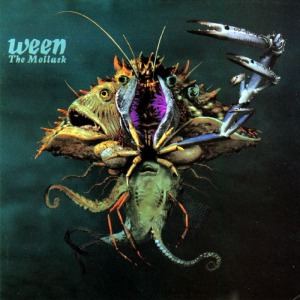
Mark Prindle’s review of Ween’s Chocolate and Cheese summarizes quite well my uncertain feelings on the group: “All of a sudden, it's no longer evident whether the Weeners are kidding or not.” And yet Prindle, having reviewed all of Ween’s discography and given high marks to most of their LPs, should be someone who gets Ween without qualification, following up that comment with “And, of course, they weren't - Ween are honestly attempting to emulate different forms of music that they happen to enjoy.” As someone who’s dabbled with Ween but never gone full-bore into their catalog, I can agree to a certain extent with both of Prindle’s statements. It’s frequently unclear whether Ween’s more serious songs are simply mimicking the seriousness of the source material they ape or if these songs are genuinely cathartic for the group (or both!), but I’ve never doubted their ability to accurately recreate the sound of a given genre, group, or era. Where I can’t agree with Prindle is in the concrete statement that they weren’t kidding. Sometimes they are, sometimes they aren’t, sometimes the joke’s in the music, sometimes the joke’s in the lyrics, sometimes the joke is in both.
My personal hesitation on fully embracing Ween on their shifting, uncertain terms is how clearly they push against my usual listening habits. Sure, I grew up with the Dead Milkmen, whose often childish sense of humor was rooted in less refined attempts at genre-hopping (the James Brown-skewering “RC’s Mom” from Beelzebubba and the Dick Dale homage “Surfin’ Cow” from Bucky Fellini being two of their more memorable genre excursions). Most groups I like nowadays are quite serious. My favorite album, Juno’s A Future Lived in Past Tense, takes itself dead seriously, even with the “I’m sorry you’re having trouble… goodbye” note at the end of the LP. Stars of the Lid’s And Their Refinement of the Decline has a few humorous song titles and its austere compositions contain occasional moments of levity, but such moments never dominate. Groups like Frightened Rabbit and The Narrator include self-effacing humor in their lyrics, but that humor comes from a personal place. I am overwhelmingly drawn to emotional, cathartic music. If it’s funny, great, if it’s not, that’s fine, too. These groups take both their music and the process of making it quite seriously. In contrast, Ween takes the process of making their music quite seriously, but the music itself fights tooth-and-nail against this seriousness. It’s a confounding listening experience, I tell you.
I understand why people often herald The Mollusk as Ween’s finest outing, the group themselves included. Unlike many Ween albums—Chocolate and Cheese, White Pepper, La Cucaracha—the group’s typically scattershot stylistic approach is reined in to a certain extent on The Mollusk. It’s not as single-minded as its 1996 predecessor, Twelve Golden Country Greats, but the prevailing whiffs of late 1960s folk and 1970s prog-rock focus the songwriting. That doesn’t mean they write fourteen of the same song—good luck mistaking the children’s musical opener “I’m Dancing in the Show Tonight” with the fluttering prog of “The Mollusk,” the electro-punk of “I’ll Be Your Jonny on the Spot” with the circular melodies of the folky “Mutilated Lips,” the Irish sea shanty “The Blarney Stone” with the New Romantic leanings of “It’s Gonna Be Alright”—and that’s just (most of) the first side. The second side emphasizes 1970s prog more, especially the faux-epic “Buckingham Green,” which launches into a remarkably self-important and then adds timpani and strings. These stylistic threads tie the songs together so that the genre-hopping makes sense.
If I’ve learned anything from thinking deeply about Ween, it’s that you really shouldn’t think deeply about Ween. It’s a simple process of learning to enjoy the apparently serious songs and the apparently joking songs alike, since the more Ween I hear, the more I realize there’s no clear distinction between the two sides. I may still be a few Ween shows and spins of albums like The Pod and Pure Guava away from ever spouting the company line of “Ween is the greatest band alive,” but I can certainly listen to it for what it is: very serious joking.
|

When greeted with the Milwaukee Avenue location’s prodigious cheap bins of seven-inches and CDs, I quickly reverted to typical Reckless Records form, reveling in the bulk of materials I trekked around the store. Yet the first thing I did after checking out was call Jon Mount to relay a depressing realization about my dollar bin CDs. I know people involved in all of almost all of these bands. Ambulette features Stephen Howard of Pinebender, who I’ve talked with at several shows. My friend Joe Martin did promotions for Brief Candles. The Midsummer/Coastal CD was released on Sun.Sea.Sky. by my friend and former Signal Drench collaborator Shawn Schultz. Del Cielo features Beauty Pill bassist Basla Andolsun, who was incredibly nice when I saw that band in St. Louis. And the Juno album was just a heartbreaker. Not only is that one of my favorite albums of all-time, I am making a documentary about the group. It simply doesn’t bode well when their album is lumped into “Generic Used CDs.”
Jon certainly understood my quandary about purchasing these albums, but I tried my best to put a more positive spin on this situation, even if it ignores the blunt truth that these bands are defunct, profoundly unknown, and/or unlikely to sell for full used price. First, in the case of the Juno CD, which I already own, I’m likely to pass it along to a friend who’s never heard of the group outside of my involvement in the documentary. If they enjoy it, they might buy A Future Lived in Past Tense or the split EP with the Dismemberment Plan. I’ve done this before with similar “I need to save this great album from the injustice of the dollar bin” finds and a few of their recipients have seen the band live or purchased another album. Second, if someone else is looking for any of these albums, they’re more likely to pay full price for them. Suckers. Third, if I enjoy one of these albums, I’m more likely to buy a full-price disc from one of these bands in the future, which might not have happened if not for this situation. I didn’t go into Reckless hoping to find Brief Candles or Midsummer albums, but their newfound place in my collection makes it more likely that I’ll check them out in the future. Finally, I do my best to buy releases from bands I enjoy at their shows, from their labels, or new from independent record stores. These points are all trumped by the blunt truth stated above, but that’s the harsh toke about much of the music I enjoy: most people don’t care as much as I do about it. In a perverse way, I appreciate that fact, since it allows me to make connections with people like Stephen Howard, Basla Andolsun, and the members of Juno, but it still pains me to be presented with the economic reality of their situation.
This internal debate between the morality of my music fandom and the quantity-loving impulse of my record collector urges will likely continue throughout The Haul. I remember being taken aback by the shock of Parasol Records’ promotions guy Michael Roux when I revealed that I downloaded music and purchased used CDs, since both methods circumvent artist compensation, but I’ve done my best to reconcile my positions since that conversation. Even this predominantly used purchase has one notable new release on it.

8. Thee Speaking Canaries – Songs for the Terrestrially Challenged – Mind Cure, 1994 – $16
My friend Scott had mailed me Thee Speaking Canaries’ Songs for the Terrestrially Challenged and Life-Like Homes back in September and I enjoyed the latter so much it was discussed in two unfinished posts for this site. (Yes, I have some catching-up to do.) At the time I couldn’t remember which Speaking Canaries LP I’d previously seen up at RRRecords in Lowell, so Scott asked if it was the original lo-fi pressing of Songs for the Terrestrially Challenged. “Lo-fi pressing? I’m intrigued!” I replied, but by the time I returned to RRRecords, they’d sold whichever Speaking Canaries album I’d seen. I’d since seen this version of the album on eBay once or twice, but didn’t pull the trigger. When I found it in the Reckless online catalog, I put it in the must-buy pile. I can’t pass on a limited edition alternate version of a Speaking Canaries album with a hand-made sleeve (Damon Che’s hand-written liner notes, random photos glued to the gatefold), even if I greatly prefer Life-Like Homes. I still need to pick up their most recent album, Get Out Alive, which, true to form, has both a long-form CD version and a pared-down LP version. If only Damon Che would devote more time to this project and spend less time making “Don Caballero” records without Ian Williams.

9. Gregor Samsa – Rest – Kora, 2008 – $27
I had originally hoped to buy this album from the band when they performed over by Berklee in the summer, but the vinyl wasn’t finished by then and I ended up missing the show. I put off buying it at Amoeba Records in Los Angeles, thinking I’d buy it from Parasol when I placed an order with them later in the winter (still hasn’t happened), but when I picked it up at the Broadway Reckless and realized how nice the packaging was, how much care the group and Kora put into this release, I figured that I should put it high on my list for my trip to the Milwaukee location. It’s one of most expensive new albums that I’ve purchased (not that it’s overpriced*), rivaled by Pelican’s gatefold 2LP for The Fire in Our Throats Will Beckon the Thaw, but I’ve never regretted picking up that Pelican album and I doubt I’ll regret buying Rest. I did question my LPs-whenever-possible policy for a moment, given that the CD has equally nice packaging and costs half as much, but the vinyl sounds superb. This album nearly topped my best-of-2008 list, so definitely buy one of the pressings.
*With regard to the seemingly high cost of this album, I learned a valuable lesson about micro-pressings of LPs when talking with Stephen Howard of Pinebender about their 2LP pressing of Things Are About to Get Weird (200 copies; get yours soon). Even without the custom artwork of this Gregor Samsa record, Pinebender was barely breaking even by charging $20 for their album. Granted, Gregor Samsa pressed 500 copies of Rest, so the vinyl itself likely cost slightly less, but the packaging certainly cost more. Given how often I pine for lesser-known bands to press their albums on vinyl, I feel compelled to support them when they go through with it, even if it’s pricier than the CD.

9. Juno – This Is the Way It Goes and Goes and Goes – DeSoto/Pacifico, 1999 – $0.50
Juno waited five years into their existence to record and release a full-length album. They did three U.S. tours on seven-inch singles. They weighed their options on labels, turning away quite a few major label scouts interested in mining any Seattle-area talent. They dropped early songs that didn’t meet their standards. They changed from their name indie producer (Steve Fisk) to the in-house engineer at the studio (Kip Beelman) midway through recording because the former was rarely in the studio and pressed the group to release an EP and the latter understood the intended scope of the record and had already done the bulk of the recording.
Too many bands rush into recording their debut album. This Is the Way It Goes and Goes and Goes is a prime example why bands should wait, road-test material, record singles, weigh their options, take time in the studio. The rush of instant gratification from a hastily recorded tour CD-R might sell some $5 CDs at your local gigs and help you buy a slightly better van, but will people still love your debut album a decade later? Or will it be something you sweep under the rug? Take your damn time.
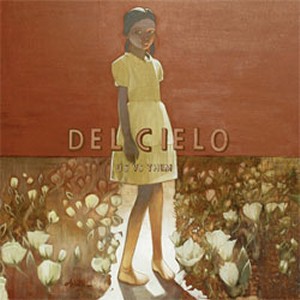
10. Del Cielo – Us Vs. Them – Lovitt, 2004 – $0.50
I was going to completely wing it on Del Cielo by mentioning how nice it was to see Beauty Pill and how I hope that Chad Clark’s doing better after his heart surgery and then going into how I wish Bald Rapunzel had recorded a second album (they shared drummer Katy Otto with Del Cielo), but I felt compelled to put the CD in my computer’s drive and actually listen to it. Not sure what I expected from Us Vs. Them, but the first few songs have been of the dynamic rockers with a bit of pop-punk creeping in on the edges and diary-styled lyrics. Andrea Lisi goes overboard on vocals a bit and doesn’t have the range of Bald Rapunzel’s singer Bonnie Schlegel, but there’s no lack of melody or energy. Faint praise perhaps, but I just felt like hearing Bald Rapunzel’s “Sun Drop” again, which is one of the better forgotten D.C. rockers.
Side note: When googling Beauty Pill to find their web site, I came across this horrible, horrible review of The Unsustainable Lifestyle at Coke Machine Glow. It's hard to imagine a reviewer missing the joke that much, but I doubt they heard Smart Went Crazy or have the slightest idea on how Chad Clark's bands do or do not fit into the D.C. scene.
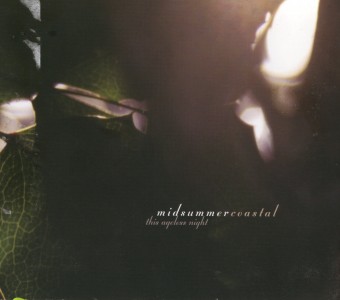
11. Midsummer/Coastal – This Ageless Night –Sun.Sea.Sky., 2002 – $0.50
I recall receiving Catch and Blur, the first Midsummer EP for review when I was doing Signal Drench and genuinely enjoying their brand of lush indie rock/shoegaze, so it didn’t shock me when Shawn Schultz signed them to Sun.Sea.Sky. for a release. I fell out of touch with Shawn after Signal Drench closed up shop, which partially explains why I never heard this split release with Coastal, but I’m interested in seeing how Midsummer progressed. I may have to track down their first full-length, Inside the Trees, which was released last year.
I’ve largely avoided returning to a few of the groups I enjoyed reviewing in the early Signal Drench days, in part because I’d usually learn of whichever bands they were ripping off a few years later and think “Oh, that’s where they got it from.” Since the majority of the promos I received were mediocre indie rock or mediocre emo, I was probably too easily impressed, but every now and then I’d find a band like Durian (Jawbox/Shudder to Think-influenced D.C. group) or Tungsten74 that I was willing to stand behind. In the case of Tungsten74, they kept getting better and better.

12. Des Ark / Ben Davis and the Jetts– Battle of the Beards – Lovitt, 2006 - $0.50
Jon Mount has been pushing Des Ark for quite some time, but this split CD is the only release I’ve tracked down, since I haven’t found the LP pressing of Loose Lips Sink Ships. He played this split album for me the last time I was in St. Louis, scoffing at some of Ben Davis’s contributions but heralding Des Ark’s side and involvement in the two collaborative tracks. Des Ark has the whole sassy titling thing going, which is a plus (“If by ‘Gay’ You Mean ‘Totally Freaking Awesome,’ then Yeah, I Guess It’s Pretty Gay” for one), but any reason for me to remember the sheer horror of Elton John’s “Bennie and the Jets” should be publically denounced. By necessity (no drummer), these songs swing more toward the folk side of Des Ark, losing the Faraquet-esque bite of the aforementioned Loose Lips Sink Ships (a solid record despite some overbearing lyrics) and sounding a bit more like Cat Power in the process. Not recent Cat Power, but What Would the Community Think/Moon Pix era. You know, the good stuff.
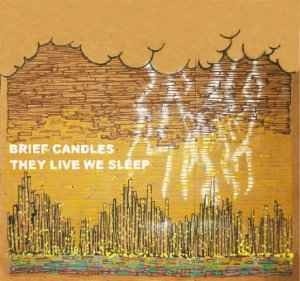
13. Brief Candles – They Live We Sleep – Latest Flame, 2006 – $0.50
Brief Candles were based out of Peoria (they’ve since moved to Milwaukee, Wisconsin) and played at least one show with personal favorites Rectangle, but I didn’t catch them during my years in Champaign. That’s a shame, since judging from the first few songs on They Live We Sleep, I would have enjoyed their blend of male/female vocals, energetic rhythms, shoegaze-inspired guitars, and occasional bursts of Sonic Youth noise. That description sounds an awful lot like what I wrote about Film School below, but Brief Candles sound far less serious than Film School, whose gravity veers close to Interpol territory. That is meant to be a compliment for Brief Candles, since they manage to keep things light despite some epic guitar crests. I’ll definitely catch them if they tour the east coast.

14. Ambulette – The Lottery – Astralwerks, 2006 – $0.50
Ambulette is (was?) the post-Denali project for Maura Davis, originally named Bella Lea, featuring former Pinebender guitarist Matt Clark, current Pinebender guitarist Stephen Howard, and prolific drummer Ryan Rapsys (Euphone, Heroic Doses, and Sweater Weather, who shared a Polyvinyl seven-inch with Days in December [Jeff Garber and a few members of Very Secetrary]). Stephen Howard was in Denali when I saw them, so it didn’t shock me that he was recruited to Davis’s new group. I’d heard this EP when it was released and wasn’t hugely impressed—Davis has always struck me as someone with more raw talent than songwriting chops, with a few exceptions on Denali’s The Instinct—but I figured I’d give it another shot. I’m unsure if Ambulette is even a band anymore, since Davis moved onto Glös, which featured her brother and Engine Down/Cursive drummer Cornbread Compton before briefly reuniting Denali last year. I’d be interested in hearing new music from her, but I’m certainly not waiting with baited breath.
A brief anecdote from that Pinebender/Denali show, which was the only concert I caught at the now-closed Nargile Lounge / hookah bar in Champaign: I remember getting to the show early and hanging out with the Pinebender guys, since I’d met them at their show at the Prairie House in Bloomington, and being introduced to the Denali crew. Davis quickly noticed that a Denali super-fan (“stalkerazzi”) had come to yet another show and quickly shuffled downstairs to avoid him. During their set it was impossible not to stare at this guy, since he was pounding his fist in the air with every syllable and belting out the lyrics. Since this show, I’ve been completely terrified of being that guy, but given that I have video documentation of the Juno reunion shows and do not exhibit stalkerazzi tendencies, I think I’m safe.
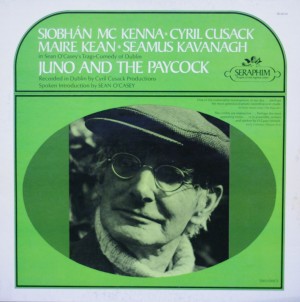
15. Cyril Cusack Productions – Juno and the Paycock 2LP – Seraphim, 1955 – $0.50
I have a small handful of literary LPs—Robert Frost reading poetry, Dylan Thomas reading poetry, Joseph Heller reading parts of Catch-22—all of which were released on Caedmon and purchased at similar prices from cheap bins. I’d gladly pick up quite a few of these albums at the right price—Camus, Pound, Faulkner, Cummings, Eliot, Auden—even though I still haven’t dropped the needle on any of the ones I already own. I learned during undergraduate that some poets are far, far better at reading their works than others and I’m not one to attend local poetry readings, but there’s a definite appeal to hearing the author recite his own work, especially when all of the authors mentioned have passed away. Caedmon is now part of HarperCollins Audio Books, but there’s a difference between hearing a sampling of work as you’ll find on an LP or hearing the entire book. I’ve never listened to an audio book in my life and, fingers crossed, never will. I’ve passed on complete performances of Shakespeare plays for that reason.
I made an exception on for this play, since it was fifty cents and I’ve put off reading any O’Casey for quite a while. I’m unsure of the official publishing date for this performance of Sean O’Casey’s play Juno and the Paycock, but the performance itself occurred in Dublin during June, 1955. It was definitely published after O’Casey’s death in 1964, since the liner notes mention it, but they fail to mention the date of release. Certainly a future candidate for Record Collection Reconciliation.
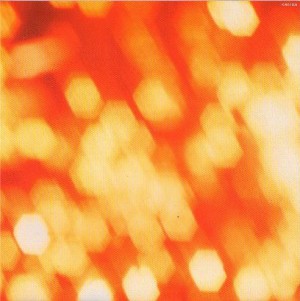
16. Jessica Bailiff – Live at VPRO Radio – Brainwashed, 2006 – $0.33
I must have seen the back of this single as I was hastily flipping through the cheap singles, since there’s no artist info on the front and Brainwashed in huge letters on the back. This acts as a positive barometer of its quality, since The Brain is usually on point in its record reviews, and gives away some vague idea of the aesthetics (Thrill Jockey/Kranky, avant-garde, possible post-[genre]). As it turns out, Bailiff now records for Kranky in a droning, somewhat post-rock-informed style of slowcore. I’m awfully proud of myself on this one, although if I’d noticed that she’d covered Flying Saucer Attack at the store I could have more accurately made those assumptions.
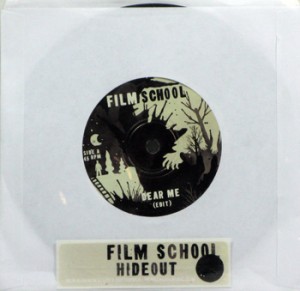
17. Film School – “Dear Me (Edit)” b/w “March Hike” – Beggars Banquet, 2007 – $0.33
Bradley’s Almanac mentions Film School on a semi-regular basis, but I’ve yet to see one of their shows or pick up one of their albums. (Sorry Brad.) I had downloaded Hideout, their 2007 album featuring “Dear Me,” but it’s one of those albums that I grabbed and skimmed a bit, enjoying said single but not making too deep into the album. Hideout apparently features a guest appearance from Colm Ó Cíosóig of My Bloody Valentine, which makes sense given the group’s mix of shoegazer tendencies and indie rock propulsion. This promotional single includes a non-album b-side and a sticker, the latter of which is headed for my big bag of stickers unlikely to ever be stuck to anything.
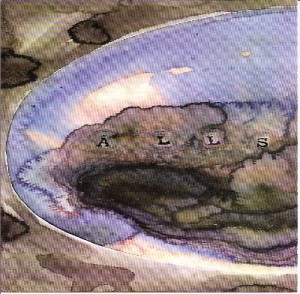
18. All Scars – “The Lineage of Time” +2 – Ace Fu, 1998 – $0.33
After seeing Ace Fu on the label, I checked out who was in All Scars in the liner notes, since I’d never heard of the group before. Guitarist James Canty comes with quite a bit of name recognition from his tenure in Nation of Ulysses, The Make-Up, Ted Leo and the Pharmacists, and French Toast and his relation to Fugazi drummer Brendan Canty (who drums for All Scars on a different release) and novelist Kevin Canty (one of Jon Mount’s favorites; I have Into the Great Wide Open sitting in the to-read queue above my desk). Brendan doesn’t appear here, but auxiliary Fugazi drummer/roadie Jerry Busher does. James Canty and Busher currently make up French Toast, who I recall seeing at the IDF in Urbana when they opened up for Q & Not U, although I can’t say I remember anything about their music.
I also bought a Reckless Records t-shirt designed by Jay Ryan. Wearing a record store t-shirt is prime evidence that you are a record-shopping degenerate, and I believe in truth in advertising.
|
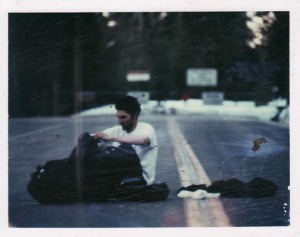
Ghost Wars, Arlie Carstens' post-Juno project with Eric Fisher of Damien Jurado's band, added two more songs to its MySpace page, bringing the grand total to six. The newest entries are "Divide and Conquer," a Hüsker Dü cover that “we slowed it down till it sounds like a Nick Drake song,” and "The Conductor," a lingering piano ballad. To those scoring at home, two more songs recallling the spacious feel of Juno's "The Trail of Your Blood in the Snow" and Talk Talk's Laughing Stock, like previous Ghost Wars songs "Virginia Long Exhale" and "Lay Down Your Weapons." If you're hoping for a Juno-esque guitar epic, have patience: I understand that more guitar-centric tracks wait in the wings.
If this glacial release of music seems cruel, here's a brief recap of why there isn't a tangible copy of Ghost Wars music in my (or your) hands right now: Carstens and Fisher had recorded the album on Fisher's laptop, which was stolen from him at a Jurado show in Toronto. The back-up external hard drive had data corruption issues, leaving them with raw, unorganized data. (Whether I would buy an album of such sounds is debatable.) Given that the project involves a wide variety of collaborators in a number of locales, the process of re-recoding this material has been arduous, but Carstens and company have been back in the studio several times since the hard drive disaster.
I'm still holding out a spot on my year-end list—whichever year it may be—for the (hopefully) inevitable Ghost Wars LP, given the strength of the available tracks, but I do wonder how much longer I'll have to wait.
|
|
Ghost Wars posted a new song on their MySpace page tonight. I've upped the song, "Virginia ,Long Exhale," as well. Put on some headphones so those clarinets don't get lost in the hum of the window fan.
There's also an update about the recording on the page (the short: the computer holding the ProTools sessions was stolen, the back-up hard drive is nearly unsalvageable, now the debate is between re-recording or slowly recovering past sessions), which may reconvene in August or September. Again, if Ghost Wars release an album in the next seven months, all of the other records are jockeying for second on my year-end list.
|
|
I’m taking a much deserved and needed break from secondary readings on torture to recap the highlights of tracks 104 through 294. Yes, it didn’t take me long to break my aim of reporting after every hundred tracks, but I ended up making a mix CD of the highlights from the first 200 tracks (I’ll try to compile the MP3s at a later date) instead of recapping them as I probably should have. Still remarkably light on long songs, so I’m moving along at a quick clip. I don’t anticipate this pace lasting.
Blast from the Past: It’s been some time since the last vestiges of my Hum ultra-fandom wore away; I’m now down to the occasional run-through of the finest moments of You’d Prefer an Astronaut (“Little Dipper,” “Why I Prefer the Robins,” “I Hate It Too”) on muggy summer nights. Dropping Electra 2000 in the playlist revived some of those old feelings, however, and it’s particularly appropriate that “Winder,” a song from which I derived my first e-mail address and AIM screenname, clicked the hardest. For all of the slightly wince-inducing vocal performances strewn about E2K, it’s easy to forget the genuinely heavy, shifting guitar riffs and Matt Talbot’s great moments of detached insight. In giving such structural priority to its charging riffs, “Winder” stands out as an energized album-closing jam, at least until the excellent bonus track “Diffuse” made it on album’s the third pressing.
Overdue Notice: The ex-Pitchblende made a notable opening appearance at the Dismemberment Plan’s semi-infamous dance party at the Fireside Bowl in Chicago—Justin Chearno’s head was clipped by the head stock of the bass, but the math-rock continued, dripping blood and all. Despite tracking down those Pitchblende CDs, I never got around to picking up Turing Machine’s debut (A New Machine for Living) or the follow-up, Zwei, but hearing “Rock. Paper. Rock.” during a commute convinced me of my errors. I might’ve been happy if the insistent guitar line chimed along for the full seven minutes, but instead Turing Machine keeps shifting the elements, letting each of the instruments have the spotlight.
Most Bizarre Transition: The first two songs of this round were Ween’s “I’m Dancing in the Show Tonight” and Ghostface Killah’s “Clyde Smith” skit. The former sounds like a slightly demented children’s song, complete with pitch-shifted vocals and recital-oriented piano backing, while the latter is also pitchshifted, dropping Ghostface’s voice down to comically deep levels for two and a half rambling minutes. The break between the piano and the unadorned announcement that “My name is Knuckles, nigga” nearly knocked me out of the driver’s seat.
Best Transition: GZA’s Liquid Swords has met any expectations I had for the album, particularly because of the extended samples of dialogue. The gasping death that concludes “I Gotcha Back” segued almost perfectly into the quiet drops of rain beginning Juno’s “The Trail of Your Blood in the Snow.” While the tone is a bit softer in the Juno song, it doesn’t belie the oncoming shudders of guitar at the end of the track or the overall content of the song, which looks at death from an entirely different perspective. This conversation between the songs even surpassed my initial awe of the smooth transition.
Best Laugh: I tend to underestimate Steve Albini’s cruel sense of humor in favor of the sonic incision of his bands, but Big Black’s “Bad Penny” combining the industrial grind of that band’s finest moments with an overwhelmingly memorable break. “I think I fucked your girlfriend once... maybe twice, I don't remember / Then I fucked all your friends’ girlfriends—now they hate you” is delivered with blend of malice and wit particular to Albini, lacking only a fuller entry in the band’s tour diary.
Biggest Breakthrough: I’d heard a few Cocteau Twins songs before this round and a few more during the course of it, but it wasn’t until “Lorelei” came on that the band’s proto-shoegaze dream pop finally hit me. The processed guitar line floats along, propelled by an unmistakably ’80s drum machine, but Elizabeth Fraser’s vocals give the song its vague approximation of shape, whether it’s her indiscernible lilt, her breathy pulse, or her multi-tracked peaks. It’s hard to think of this song without thinking of it as a prototype for the pop songs on Loveless, but I hardly mean to demote it to a footnote in My Bloody Valentine’s history.
Pleasant Surprise: When Stars of the Lid’s “Tippy’s Demise” came on during the tail end of my commute to BC today, I was a little concerned about the typically minimal nature of their work being difficult to hear over the din of traffic. But “Tippy’s Demise” seems far less ambient than the other tracks I’ve heard from And Their Refinement of the Decline, swelling with instrumentation halfway through the song before receding away. Unlike a few songs from the new Eluvium record featuring fuller, more classically oriented arrangements, “Tippy’s Demise” doesn’t edge toward awkward sentimentality, only emotional directness. I’m beginning to worry about the purchasing pile I’ll have to deal with in the coming months.
|
|
The first round of iPod Chicanery is done after nearly three months. In retrospect, I wish I had posted more frequent updates about the project, but that aspect was lacking my typical level of obsessive specification. This round counted for the final 261 of the 1164 total songs and seemingly went much faster than the previous rounds, but I can’t validate that with any sort of information.
Overlooked Facet: I really have to thank any of the people who sat in on this project as I drove around Boston. My wife took the brunt of it, but I’m guessing that at least ten other people suffered through the curious will of my iPod. Next time I’ll try to keep track of who has to listen to what.
Double Take: When I heard Slint’s “Glenn” on a gray morning, I thought that it fit perfectly with the uneasy cast of the Cambridge streets. That completely alien guitar line floors me every time I hear it, so when the song came up in the final hour of the project, I was worried that I might have comprised the integrity of the project. No, the issue was that the Slint EP had somehow made it onto my Nano twice, once as indie and once as post-rock. I’m somewhat surprised that I didn’t notice when “Rhoda” came up a second time, but the first time probably wasn’t within the prior few days.
Best Transition: I’m usually disappointed when two songs come in a row, but hearing Tungsten74’s “Guitar Solo and “Come Sweet Death” (two rare short songs in their catalog) back to back worked surprisingly well. Both songs may seem like transitional pieces on Aleatory Element and Binaurally Yours, respectively, but the precise layering in each track condenses their typical sprawl quite well.
Stealthy Long Song: I initially thought Philip Glass’s “Mad Rush” was another fine entry from Solo Piano that would pass by in about six minutes, but it kept going for almost fourteen. I was more surprised than dismayed, however, as I’ve become a fan of Glass’s piano-oriented work since picking up Glassworks on LP last year. I remember that particular commute taking much longer than usual, so “Mad Rush” may not have been accurate in terms of the title, but the song made the wait a bit easier.
New Favorite Song: I feel like I’ve switched favorite Lungfish songs every other day since finally getting into them this year, but “Fill the Days” from Indivisible has a great combination of a memorable riff and prototypically great lyrics. “Fill the days with significant waste / Fill the days with meaningful refuse / Fill the days with interesting things to say / Fill the days with gradual decay” has been running through my head since it came up on random (grabbing the LP in February hasn’t hurt, either), and though it doesn’t quite take the lyrical expanse of “Space Orgy,” “Hallucinatorium” or “Creation Story” into account, that perspective on day-to-day living is a bit more accessible (read: less shamanistic) to my existence. I don’t know why I never picked up this record after hearing a minute sample of this song on the Southern web site, but it’s better late than never.
New Favorite Album: I’ve come to realization that while the peaks on Speaking in Tongues make for most of my favorite Talking Heads songs, Fear of Music is a more consistent record in terms of songwriting and aesthetics. The afro-beat influence never overwhelms the post-punk nerviness. “Animals” and “Heaven” stuck out particularly during this round, but every song made me turn my head.
Join the Club: The lyrics on Interpol’s Turn on the Bright Lights are almost uniformly laughable. If not for the instrumental precision and Paul Banks’s delivery, I don’t know if I could stomach this record. I don’t know if I could make the same case for Antics, a record that lacks some of the solid album tracks like “The New.”
Worst Pause: Hearing Swirlies’ “San Cristobal de las Casas,” one of my work-out jams, on the drive to the Middle East for the Twilight Sad / A Northern Chorus show, got me drumming on the steering wheel, but pausing it halfway through to run out into the cold rain seemed unfair to the song. I had the final minute and a half waiting for me on the ride home, which meant that I started it up again in the midst of one of those galloping riffs.
Best No Pause: I got to hear Juno’s “Leave a Clean Camp and a Dead Fire” in its entirety on a run up to Reading last Friday. Thankfully I didn’t have to accelerate at the same measured pace as the song; I hit its high point immediately after merging onto 93 and kept it there (namely 77 on cruise control) until I reached my destination.
Unkind Perspective: None of the subsequent June of 44 records topped Engine Takes to Water in my view (although Four Great Points came close), but the bizarre beat poetry of “Pale Horse Sailor” has never sat well with me. Hearing it again and not being able to skip it made me remember how frequently June of 44 veered toward unjustifiable self-indulgence. “Sharks and Sailors” turned this sort of nautical fetishism into an actual song, so its aimless precursors should be retroactively erased.
Final Run: If not for Talking Heads’ “Electric Guitar”—an excellent song that transitioned poorly—the final two songs of the project would have been Mock Orange’s introspective “Old Man” and Eluvium’s “Perfect Neglect in a Field of Statues,” an amazing combination of statement and reflection, but the final three was still manageable.
|
|
It’s been some time since the last update, but the first entry should explain why. I’m down to 261 remaining songs spanning 20 hours, which seems remarkably manageable considering the 900 I’ve been through.
Biggest Realization: About halfway through this endeavor I recognized that the excitement of hearing unfamiliar songs at unfamiliar times had slowly dissolved into a new familiarity. Yes, I still have unfamiliar songs waiting, but they’re all from albums whose aesthetic I’ve accepted as part of the fray. I’ve realized that if I do this again (and I’m really thinking about keeping this going for at least one more round), I have to bump the ratio of familiar records to unfamiliar records far more to the latter, particularly on genre inclusion (i.e. more rap, jazz, and classical) and not include entire records for some artists so I can mix up the flow even further. I already have some ideas of records I need to include and records I need to dump, but if any readers have suggestions of records that I tend not to mention and might do well to include, I will probably use those suggestions for round two.
Strangest Grouping: Sandwiching a classically oriented track from Eluvium’s Copia between two tracks of Pilot to Gunner’s DC-styled indie rock threw me for a loop. I can understand one of those PTG songs coming up, but hearing two of the eleven tracks from Games at High Speeds in that scenario was just baffling.
Flashback: I threw Arab Strap’s Philophobia on the iPod, but I hadn’t ran into too many of its tracks until this round. I typically mention how strong Arab Strap’s dynamic rockers are—the live version of “Girls of Summer,” “Pulled,” “We Know Where You Live”—but I have to admit that the skeletal aesthetic blueprint of Philophobia fits the subject matter better than the fleshed-out arrangements of later records. Most of the songs succeed with thoughtful guitar lines and drum machines, so when flourishes come up, whether in the horns of “The Night Before the Funeral” or the twinkling piano of “Islands,” they seem like respites from the din of sexual frustration, not defining aspects of the sound.
Best Album Track: “Monkey Man” helped the slow process of seeing the Rolling Stones more as an album band and less as a singles band. I grew up on Hot Rocks and always appreciated that side of the band, but including Let It Bleed and Beggars Banquet (Aftermath hasn’t fared quite as well) in this round has helped bring some of those album tracks to the forefront. Next round I’ll include Sticky Fingers and Exile on Main Street.
Best Timing: I knew that Godspeed You! Black Emperor’s “BBF3” would come up at some point, but not having listened to the group much since seeing them in 2000 and knowing the track’s eighteen minutes would take a significant chunk out of a commute made me a bit wary. Fortunately the song started playing during my ride home last night, a grey, dreary commute from Boston College to MIT in the midst of a light snow. It truly came into form when I had to navigate the narrow lanes of Memorial Drive, gazing over at the foggy abyss of Boston proper over the half-frozen Charles. Turning Boston into a post-apocalyptic wasteland was significantly easier than I imagine.
Worst Timing: Silkworm’s “Give Me Some Skin” is one of the group’s finest moments, defined by a cavernous drum sound and a particularly affecting Tim Midgett vocal performance. Yet hearing it on what appeared to be the first day of spring (spoiled a few days later by the above-mentioned snowfall) was completely antithetical to its strengths. “Do you think it took talent or vision / to be strung up on a pine tree in the snow?” just doesn’t sound right amidst the first blast of near 70 degree temperatures and a shining sun.
Most Memorable Double-Shot: I keep hearing about the Lungfish trance, but even though I feel like I “get” the band’s appeal, I hadn’t hit the trance until hearing “Cut to Fit the Mouth” and “Indivisible” back to back on a commute home. I ended up being honked at after zoning out at a traffic light on Cambridge Street, which bums me out since I measure my success as a Boston driver as having a good ratio between honking at other people and being honked at by other people. Those two songs don’t rock as hard as “Space Orgy,” “Mated,” or “Fill the Days,” but they have that mid-tempo Lungfish repetition that just sucks me in.
New Pick for Favorite Song: Cat Power’s “Metal Heart” from Moon Pix had long stuck out as one of the finer songs in her catalog, but I always leaned toward some of the singles as my favorite song. Hearing “Metal Heart” to start the long drive from Pleasant Valley to Somerville changed that, though, as I was completely absorbed by the subtly multi-tracked vocals as I passed by rural farmhouses and small towns on my way up the Salt Point Turnpike to reach the Taconic. “You’re losing the calling and you’ve been faking / and I’m not kidding” seems like the inverse to the firebrand dismissal of Juno’s “The French Letter,” that sentiment stripped of the threat of violence and given a slight hint of hope with “I was lost but now I’m found / was blind but now I see you.”
|
|
Please bookmark junodoc.com if you're at all interested in the project. If you have anything to contribute (footage, pictures, stories, etc.), e-mail jon at junodoc.com rather than any of my e-mail addresses.
|
|
The trip to Seattle for the two Juno reunion shows for the KEXP Winter Benefit was absolutely exhausting, but I can confirm that those plans to record the shows blossomed into what might be called film-ish or documentary-esque. Three camera shoots of both nights? Check. Sixteen-track audio of both shows? Check. Hours of interview footage with band members past and present? Check. Immediately available product? Well, no, but...
We should have a website devoted to this project in the very near future, so if you're reading this and have footage, photos or posters of Juno you'd like to contribute, e-mail me (sebastian at newartillery.com) to get the ball rolling.
I'd like to thank Arlie Carstens, Gabe Carter, Jason Guyer, Greg Ferguson, and Jason Lajuenesse for the entire weekend.
A selection of my pictures can be seen here.
|
|

